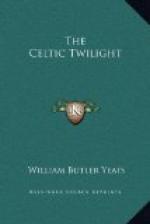A friend has sent me from Ulster an account of one who was on terms of true friendship with the people of faery. It has been taken down accurately, for my friend, who had heard the old woman’s story some time before I heard of it, got her to tell it over again, and wrote it out at once. She began by telling the old woman that she did not like being in the house alone because of the ghosts and fairies; and the old woman said, “There’s nothing to be frightened about in faeries, miss. Many’s the time I talked to a woman myself that was a faery, or something of the sort, and no less and more than mortal anyhow. She used to come about your grandfather’s house—your mother’s grandfather, that is—in my young days. But you’ll have heard all about her.” My friend said that she had heard about her, but a long time before, and she wanted to hear about her again; and the old woman went on, “Well dear, the very first time ever I heard word of her coming about was when your uncle—that is, your mother’s uncle—Joseph married, and building a house for his wife, for he brought her first to his father’s, up at the house by the Lough. My father and us were living nigh hand to where the new house was to be built, to overlook the men at their work. My father was a weaver, and brought his looms and all there into a cottage that was close by. The foundations were marked out, and the building stones lying about, but the masons had not come yet; and one day I was standing with my mother foment the house, when we sees a smart wee woman coming up the field over the burn to us. I was a bit of a girl at the time, playing about and sporting myself, but I mind her as well as if I saw her there now!” My friend asked how the woman was dressed, and the old woman said, “It was a gray cloak she had on, with a green cashmere skirt and a black silk handkercher tied round her head, like the country women did use to wear in them times.” My friend asked, “How wee was she?” And the old woman said, “Well now, she wasn’t wee at all when I think of it, for all we called her the Wee Woman. She was bigger than many a one, and yet not tall as you would say. She was like a woman about thirty, brown-haired and round in the face. She was like Miss Betty, your grandmother’s sister, and Betty was like none of the rest, not like your grandmother, nor any of them. She was round and fresh in the face, and she never was married, and she never would take any man; and we used to say that the Wee Woman—her being like Betty—was, maybe, one of their own people that had been took off before she grew to her full height, and for that she was always following us and warning and foretelling. This time she walks straight over to where my mother was standing. ’Go over to the Lough this minute!’—ordering her like that—’Go over to the Lough, and tell Joseph that he must change the foundation of this house to where I’ll show you fornent the thornbush. That is where it is to be built, if he is to have luck and prosperity,




